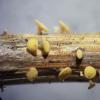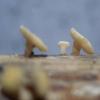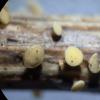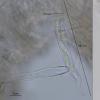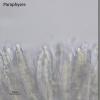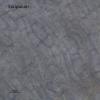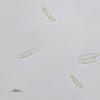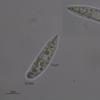
10-02-2026 17:42
 Bernard CLESSE
Bernard CLESSE
Bonjour à toutes et tous,Pourriez-vous me donner

10-02-2026 18:54
Erik Van DijkDoes anyone has an idea what fungus species this m

09-02-2026 20:10
 Lothar Krieglsteiner
Lothar Krieglsteiner
The first 6 tables show surely one species with 2

09-02-2026 14:46
Anna KlosGoedemiddag, Op donderdag 5 februari vonden we ti

02-02-2026 21:46
Margot en Geert VullingsOn a barkless poplar branch, we found hairy discs

07-02-2026 20:30
 Robin Isaksson
Robin Isaksson
Hi!Anyone that have this one and can sen it to me?

25-01-2026 23:23
Hello! I found this species that resembles Delitsc
Hymenoscyphus
William de Jong,
21-11-2021 10:36
I would like some help in identifying this Hymenoscyphus.
Found it (yesterday) on a half-dead flowering stem of Symphyotrichum (The Netherlands). Apothecia max. 1.5 mm diameter, not reddening. I found croziers I think. Spores with quite some oil content: 20,8-22,6 x 4,7-5,1; no cilia observed.
For other details, see pictures.
Does anyone recognize this Hymenoscyphus?
Thanks in advance.
Best regards,
William
Hans-Otto Baral,
21-11-2021 11:32

Re : Hymenoscyphus
Looks like croziers indeed. What is not clear is the paraphysis content (in vivo). Strongly refractive multiguttulate?
Symphyotrichum is a genus with England-Aster etc. Is the stem herbaceous or woody?
H. virgultorum has similar spores but lacks croziers and grows on woody substrates.
H. fucatus has larger spores with larger LBs.
So I have no idea.
William de Jong,
21-11-2021 13:05
Re : Hymenoscyphus
Thank you very much for your answer Zotto!
It's indeed something like England-Aster - Aster novae-angliae, or a close relative. The lower part of the stem where the Hymenoscypes was growing is definitely more woody than herbaceous. The content of the paraphysis (in vivo) is not strongly refractive multiguttulate.
(In the attached picture in my first post I accidently posted a close-up of one of the paraphysis in Lugol, my apologies.)
Okay, Hymenoscypus sp. it remains. Thanks again for your help.
Best regards, William
It's indeed something like England-Aster - Aster novae-angliae, or a close relative. The lower part of the stem where the Hymenoscypes was growing is definitely more woody than herbaceous. The content of the paraphysis (in vivo) is not strongly refractive multiguttulate.
(In the attached picture in my first post I accidently posted a close-up of one of the paraphysis in Lugol, my apologies.)
Okay, Hymenoscypus sp. it remains. Thanks again for your help.
Best regards, William
Hans-Otto Baral,
21-11-2021 15:27

Re : Hymenoscyphus
The absence or inconspicousness of VBs in the paraphyses would be a rare and remarkable feature and worth to photograph, especially in order to see if they were alive or not. Best in oil immersion.
